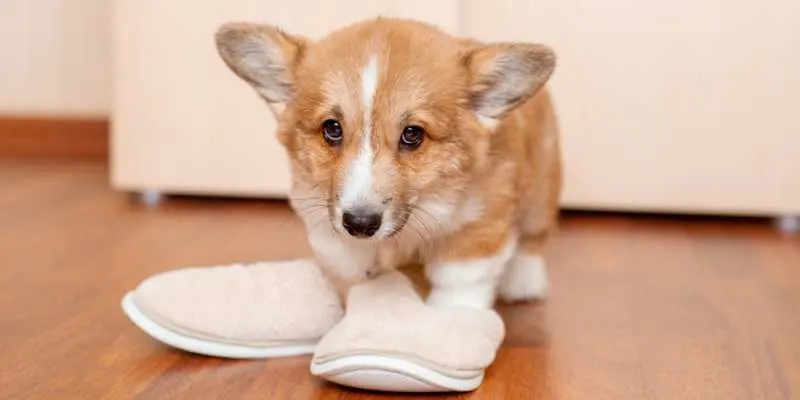Probably the most asked question about corgis is “are corgis good house dogs?” and it’s because the majority of people who plan on buying a corgi live in a house and want a dog that is suitable for those living conditions.
Let me tell you something, corgis are not only good house dogs, but they are also amongst the best! I made this claim for a couple of reasons, but it’s not all that simple to explain in just a few words.
That is why I have written this article – to explain to you in great detail why corgis are good house dogs and what to pay attention to when getting a corgi for your house.
Join me in this little trip down the memory lane where I’ll also share with you my experiences when I took my first corgi to my house.
Let’s jump straight into it!

Are Corgis Good House Dogs? – Essentials
There are just a few essential things that you need to know before you let your corgi march into your house and make it its own! I’d like to list all of these essential topics that need to be brought to your attention so you have a better understanding of where this article will take you.
- Things you’ll need to take care of your corgi
- House rules
- Yard vs. no yard
- Potential problems
Now, all of these might seem frightening to you, but I assure you, once you get all the basics down you’ll see that there’s nothing much to it. I know that buying or rescuing a new puppy can be stressful, especially if it’s your first dog ever, but let me tell you, in just a few weeks – you’ll experience joy like never before!
Now let’s get down to business and take apart every single one of those in order to make it easier for you to understand what’s next for you.

Things You’ll Need To Take Care Of Your Corgi
This is only referring to the things you’ll need to buy for your house in order to make your corgi feel as comfortable as possible right from the start. You might overlook the existence of certain tools that can make your life quite easier and carefree from the moment your new corgi sets their paws on your house’s floor.
The first thing is a proper sleeping “nest”. You can always substitute it with a big enough indoor cage that your corgi will have a lot of space to move around in, which is exactly what I do.
Sleeping on a hard wooden floor or on a hard plastic floor of a said cage is not particularly comfortable, so I recommend you invest in a nice sleeping bed (or nest) for your corgi to make sure they are comfortable while sleeping or napping.
It’s also highly advisable to make it a habit of theirs to sleep in the same spot every night because if you leave your corgi all alone at night they might think it’s a good idea to nibble some table legs or chairs and you’ll be in such a deep sleep that you won’t be able to stop them.
For that reason, you should think about buying a cage and putting a bed inside. Don’t make the same mistake I made and think blankets are enough because if your corgi is experiencing some teeth growth or just wants to nibble at something, the end of a blanket is a perfect target.
Number two is a high-quality fence in case you have a backyard. This is quite important as corgis are extremely smart dogs and won’t be able to stop themselves from jumping through a hole that they may be found in your old fence.
Regular short fences for indoors might do it in particular places where you think your corgi might have room to wiggle through and get to the streets. I invested in some quality fences years ago and it was worth every penny. The security of your dog is priceless so don’t try to save some money on this – trust me.
The third thing is to give them a lot of toys. Houses are usually filled with stuff that your corgi might want to nibble on but shouldn’t.
Especially if you have a few PVC pipes that are easily reachable for your dog. For that reason alone I recommend providing your corgi with a lot of toys that will occupy them for the whole day and keep them away from nibbling on things that should stay intact.
The fourth one is optional. If you have a room that your corgi is prohibited from entering, I suggest investing in an indoor fence that you can easily jump over but will keep your corgi away from all the cables for example.

House Rules
You should consider the fact that corgis are prone to setting their own rules if they aren’t presented with another set of rules that should be yours as an owner of your dog and the house itself.
I’ll tell you about some rules that should be implemented in order to make your life easier while preventing your corgi from making their own rules and becoming the owner of the house.
I’m telling you this because corgis are quite known (some would say notorious) for their stubbornness in making their own rules in the house. Some of the best rules to set (in my opinion) are:
- Peeing and pooping is done at the time that you set
- No means no
- You both eat at the same time
It’s important that your dog understands that peeing and pooping are done at the same time every day. If you don’t establish this rule your dog will bark and howl every time they want to “take care of business” and won’t be able to learn to hold it until it’s time for going out.
No means no is probably the biggest one on the list. This means that you need to teach your corgi to distinguish between you joking around with them and not being serious, and the moment when you say “no” seriously. In situations where your corgi is doing something they clearly shouldn’t be doing this is crucial and can not be replaced with any other kind of authority you might be in your dog’s eyes.
Eating at the same time is also quite important. By doing this you prevent your dog from jumping on you or the table while you eat. They’ll be preoccupied with their own food and won’t give you any trouble while you’re trying to enjoy your meal.

Yard VS. No Yard
Trust me – it makes a difference. First, let’s take a look at some benefits of having a yard, and then I’ll tell you some things you can do to make your life easier if you don’t have one.
The biggest difference is in potty training and pooping/peeing. Let me explain – when you have a back yard it’s much easier just to open the back door and let your dog out to pee or poop.
Not only does this mean that you don’t have to get ready and leave your house, but it also means that your corgi will develop a healthy routine.
What I mean by this is that they will instinctively probably just stand in front of the door that leads outside and give you some kind of a signal that will mean that they want to go outside.
It’s also quite good to have a yard because if your corgi needs physical activity and you’re in a rush, you can always let them roam free and run up and down the yard.
It’s a good plan B in most scenarios where you don’t want to neglect your dog’s need, but you also have some other business to take care of.
If you, on the other hand, don’t have a backyard, it’s smart to find a nearby dog park that you will use daily to take out your dog.
The walk to the park shouldn’t be too long because the purpose of going there is to let your corgi spend all of the extra energy that they have stored.
If the walk back to the house is too long, your corgi will refuse to walk and you’ll have to either wait for them to collect some energy, or you’ll have to carry them home.
Another good thing to consider when you don’t have a yard is the walk down the street. By doing this constantly, your corgi will probably find a three or two to pee on which will stimulate them to poop as well.
It’s a good way to shorten the time needed for your corgi to do what it has to do. If the street is too busy, find an alleyway to serve this purpose.

Potential Problems
There might be some things that your corgi may do if you live in the house. The first thing to think about is the pipes that are often exposed in the parts of the house.
If the pipes are from PVC, your corgi might want to nibble on them and you all know what that means – new pipes every few months!
Another thing is that they’ll zoom through the house because if they see an open space that is to their liking – there’s a good chance they’ll run in that space.
Be extra careful to remove any sharp objects like tables with sharp edges or stools with sharp details that might be in the way if you see your corgi doing something like that.
Also, if your house is spacious and you’re, for example, on the first floor of the house and your dog is downstairs, they might feel lonely and start howling. This is easily preventable by just giving them a sign that you’re there. Shouting their name or making a well-known noise might do the trick!

Summation
I think it’s quite clear that if you do at least half of the things I’ve listed that you and your corgi will live happily in a house. Corgis don’t need much in their life to be happy, so don’t think that they are high maintenance and that you shouldn’t keep them in the house because of that.
Just remember to set your own rules, make it safe and establish a routine that will be pleasant for both you and your corgi. There’s really nothing left to say other than – go get your corgi and see how the house lights up with positive energy the moment they set their paws in your home!

